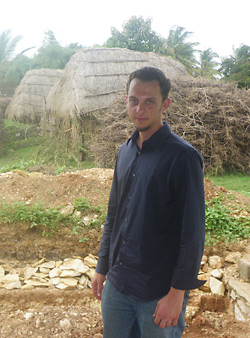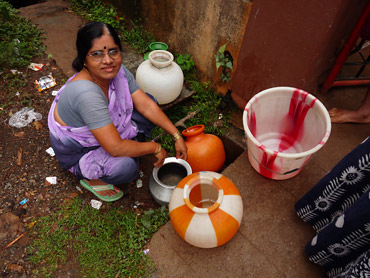A 411 on water’s next drop

ON TAP: Ari Olmos, a master’s student in public policy at UC Berkeley, in the south India city of Hubli, where he helped implement NextDrop, a mobile phone–based alert system that notifies residents when household water will be flowing in their taps. (Photo by NEXTDROP.)
In the south India city of Hubli, turning on the tap is no easy task. Residents frequently skip work, postpone errands or keep children home from school in anticipation of the precious—but notoriously unreliable—arrival of water along urban pipelines. Missing a delivery can translate into days without household water.
“Literally, people wait around their house until the water comes on,” says Anu Sridharan (B.S.’09, M.S.’10 CEE). “We’ve met people who’ve missed weddings, funerals and meetings.”
Sridharan is part of a Berkeley-based student team pursuing a novel—but surprisingly simple—fix to what is a common occurrence in the developing world. Their project, called NextDrop, deploys ubiquitous mobile phones to alert residents when water is flowing in a neighborhood.
Mobile phones “are everywhere,” explains Emily Kumpel, a doctoral student in civil and environmental engineering and NextDrop team member. “They’re a very easy way to get information to people.”
NextDrop, a first-place co-winner in UC Berkeley’s 2010 Big Ideas competition, partnered with a local non-governmental organization last summer to begin a pilot study of some 200 households in Hubli.
The students recruited residents to form a mobile phone network in which participants called NextDrop when water arrived in their neighborhood. Once the call was received, NextDrop verified the information by contacting two other households, then generated cell phone messages to all participants served by the same water valve.
Encouraged by preliminary results, NextDrop is refining and expanding the program. For instance, after discovering that many older residents are unfamiliar with text messaging, NextDrop is switching to an interactive voice response system that automatically alerts customers in their regional language of Kannada when the water is on.
The team recently partnered with the local water board to exchange information about water deliveries. NextDrop may charge a nominal monthly fee for water notification service and is already awarding micropayments to customers who are the first to alert them to water availability. By relying on such crowdsourcing, the students expect to keep charges low.
“The technology itself is pretty simple,” says Kumpel, whose team includes graduate students from Berkeley’s School of Information and Goldman School of Public Policy as well as Stanford’s M.B.A. program.
If successful, NextDrop’s approach could have truly global applications. Water systems are unpredictable and intermittent in an estimated 90 percent of the cities in South Asia and a third of the cities in Latin America and Africa, the team estimates. “It seems like a service that could really work and have a pretty profound impact,” says NextDrop member Ari Olmos, a master’s student in public policy.

NOT A DROP TO DRINK: NextDrop could be a useful service in an estimated 90 percent of the cities in South Asia and a third of the cities in Latin America and Africa, where water systems are unpredictable and intermittent. (Photo by NEXTDROP.)
Typically, people in Hubli receive water once every five to eight days through in-home or community taps. During the two to eight hours when the water is flowing, families spring into action. They fill pots, plastic jugs and every possible container with water. More prosperous households use rooftop or underground tanks. “A lot of household chores happen when the water is there,” says Kumpel, whose dissertation focuses on water quality in areas served by intermittent water supplies. “You save up dishes, laundry and all these tasks for when the water is on.”
When a family misses a delivery, they might borrow water from a neighbor or resort to unsafe well water, which carries the risk of water-borne pathogens. “It’s a lot of stress if you don’t know when the water is coming and it’s your job to collect it,” says Sridharan, noting that duty often falls to the women in the household. “These women can’t go out with their friends, go out to the market; they can’t do anything.”
NextDrop got its start in fall 2009, when Kumpel and others won a competition in a School of Information class involving the use of information and communication technologies for international development. Their instructor, assistant professor Tapan Parikh, serves as the project’s adviser.
Along with providing near real-time information about water delivery, NextDrop could alert other neighborhoods down the pipeline about forthcoming deliveries and inform residents when an expected delivery will be delayed.
Team members are seeking more funding to advance their project. Last year, they won grants from the Gates Foundation and the Clinton Global Initiative in addition to an $8,000 award from the campus’s Big Ideas program.
For NextDrop members, the project’s stakes are big. “It’s just mind blowing to me that people don’t have access to this basic need,” says Sridharan. “It’s just a matter of closing an information gap.”